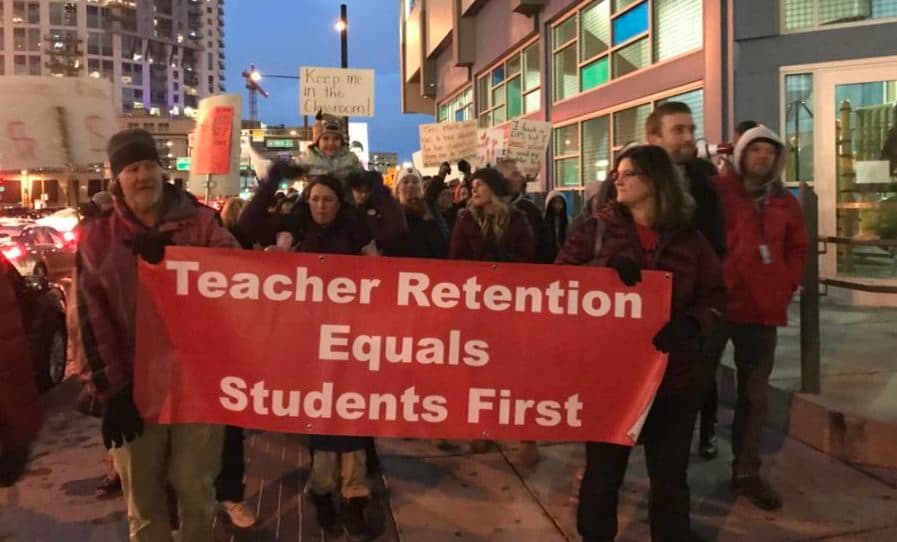Arguing that intervention would be "futile," the Denver teachers union has formally asked state labor officials to stay out of a contract dispute between the union and the Denver school district over how to pay the district's teachers.
Intervening in the matter -- which would further delay a teacher strike that was originally set to begin Monday -- "would be an endorsement" of the district's "recent abusive tactics," the union wrote in a response filed Monday to the district's request for state intervention.
The district and the union are at odds over how to revamp Denver Public Schools' teacher pay system, known as ProComp. The union wants to invest significantly more money into teachers' base salaries. The district has also proposed increasing base salaries, but has pushed to keep sizable bonuses that incentivize teachers to work in hard-to-fill positions and high-poverty schools. The union argues that relying on bonuses makes teachers' pay unpredictable.
"The philosophical difference behind the salary schedules is preventing the parties, as it has for many months, from reaching agreement on a new compensation scheme," says the response from the Denver Classroom Teachers Association.
Also contributing to the stalemate, according to the union: "a broken relationship" between the district and the union that no state officials -- not even the governor -- can mend.
"Only DCTA and DPS can repair their relationship," the union response says, "and that process will begin once they re-establish mutual respect through the bargaining process."
The "abusive tactics" described in the union filing include an email to schools from a district human resources employee that said immigrant teachers here on visas would be reported to immigration authorities if they participated in a strike. The district has since apologized for the email, which the superintendent said was factually wrong and should not have been sent.
But the union said these types of communications are meant to intimidate teachers and are likely to continue until the larger disagreement is resolved.
The two sides have been negotiating the ProComp agreement for 14 months. At the end of a marathon bargaining session on Jan. 18, union negotiators rejected the district's latest offer and ended the talks, thereby letting the contract expire. On Jan. 22, the union announced its members had overwhelmingly voted to strike.
Last Wednesday, district officials formally requested intervention from the Colorado Department of Labor and Employment. The district's request had the effect of delaying a strike that could have begun Monday at the earliest. Teachers cannot legally strike while Colorado Gov. Jared Polis is deciding whether state labor officials should try to broker a deal between the two sides. Polis has 14 calendar days to make a decision.
Nothing prevents the two sides from continuing to meet in the meantime. However, union officials have said they don't see a good reason to talk unless the district is prepared to put more money into teacher compensation. Right now, about $8 million separate the union and district proposals.
The state cannot impose an agreement, but it can require the district and the union to participate in mediation, deploy a fact-finder to investigate competing claims, or hold public hearings. That process could take as long as 180 days.
District officials made clear they believe those methods could help. The two sides had already been working with a mediator, but the district noted in its intervention request that every bargaining session has "occurred in public in front of large audiences and news crews filming all conversations," a setting that "does not encourage genuine conversations."
Colorado law requires teacher contract negotiations to be open to the public. However, Alexandra Hall, director of the Division of Labor Standards in the Colorado Department of Labor and Employment, told Chalkbeat the department is exploring with the state Attorney General's Office the possibility of moving the talks behind closed doors.
Union officials have said they would not agree to private bargaining.
When bargaining ended late on Jan. 18, the union was requesting the district invest an additional $28 million of its $1 billion budget into teacher pay. The district was offering an additional $20 million -- a proposal officials called "generous."
A teacher strike would negatively impact students, parents, and teachers alike, district officials wrote in their intervention request. Vulnerable students -- including those who rely on school for meals, mental health services, and nursing care -- would be most at risk, they argued.
The union pushed back on that assertion, noting in its response that a weeklong teacher strike in the southern Colorado city of Pueblo in May did not result in catastrophe. The union also cited a poll that it conducted in early January that showed 89 percent of Denver parents side with the teachers in the pay dispute, and 69 percent of parents would support a strike.
Read the entire response from Denver Classroom Teachers Association here:
DV.load("https://www.documentcloud.org/documents/5698456-2019-01-28-Response-in-Opposition-to-DPS-Request.js", {
responsive: true,
container: "#DV-viewer-5698456-2019-01-28-Response-in-Opposition-to-DPS-Request"
});
2019 01 28 Response in Opposition to DPS Request for Intervention (PDF)
2019 01 28 Response in Opposition to DPS Request for Intervention (Text)
Chalkbeat is a nonprofit news site covering educational change in public schools.













